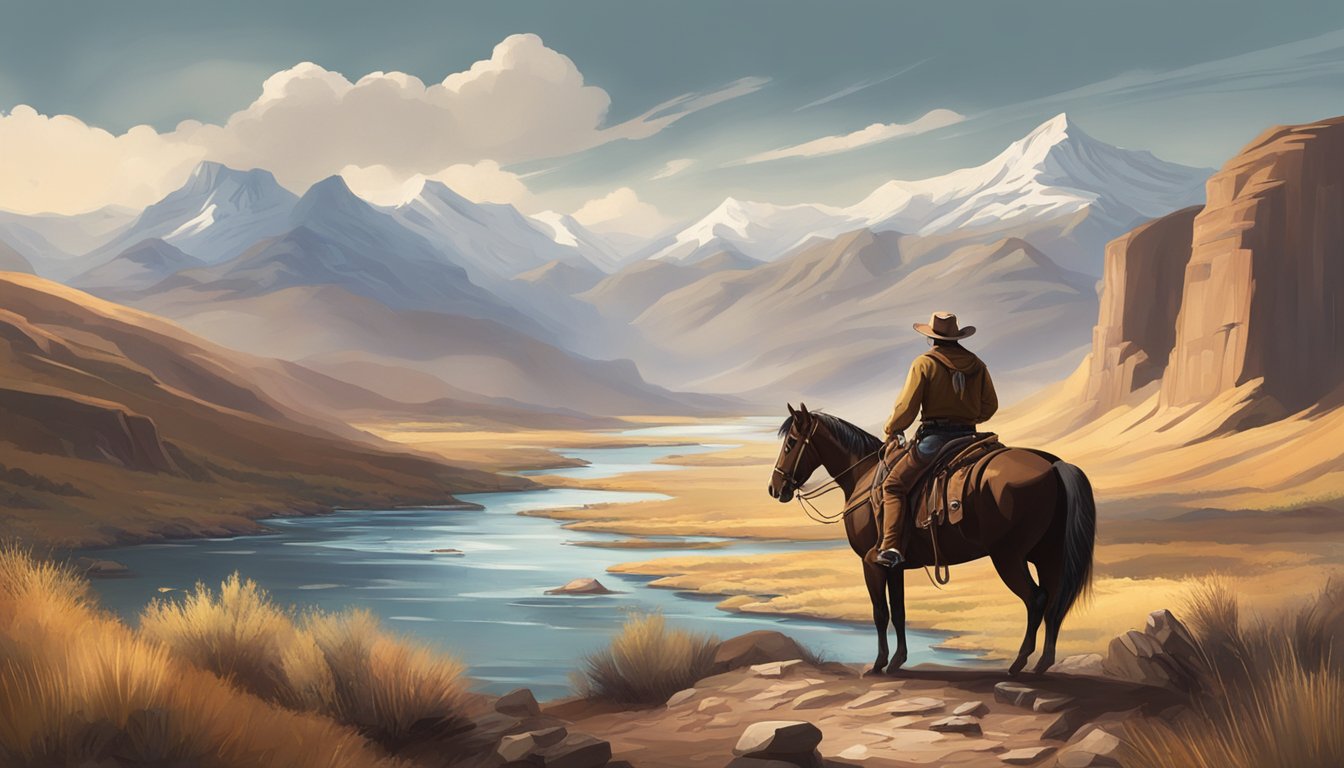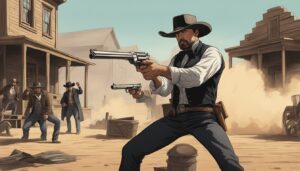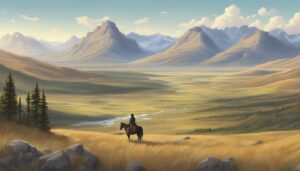Western films have long captivated audiences with their rugged heroes and tales of frontier justice. Two iconic characters stand out in this genre: John Dutton from the modern TV series “Yellowstone” and the Ringo Kid from the classic 1939 film “Stagecoach.” Both embody the archetypal Western hero, but each brings unique qualities to the screen.
John Dutton, portrayed by Kevin Costner, is a complex patriarch fighting to preserve his family’s vast ranch in contemporary Montana. His character blends traditional cowboy values with modern-day challenges, showcasing a multi-layered personality that resonates with today’s viewers. The Ringo Kid, played by John Wayne in his breakout role, represents a more traditional Western hero – a straightforward, tough-as-nails gunslinger with a clear sense of right and wrong.
Comparing these two characters offers insights into how the Western genre has evolved over time. While the Ringo Kid exemplifies the classic Hollywood cowboy, John Dutton reflects the nuanced, morally ambiguous protagonists of contemporary Western storytelling. Their differences highlight the changing nature of heroism in American culture and the enduring appeal of the Western genre.
Exploring the Western Genre
The Western genre has undergone significant evolution since its inception, with directors like John Ford leaving an indelible mark on its development. From classic tales of frontier justice to modern interpretations set in contemporary landscapes, Westerns continue to captivate audiences with their exploration of American mythology and rugged individualism.
Evolution from Classic to Modern Westerns
Classic Westerns often portrayed a romanticized version of the American frontier, featuring heroic cowboys and lawmen. Films like “The Searchers” (1956) set the standard for traditional Western storytelling. The 1960s saw the rise of Spaghetti Westerns, introducing grittier anti-heroes and morally ambiguous narratives.
Neo-Westerns emerged in the late 20th century, bringing Western themes into contemporary settings. These films and TV shows, like “Yellowstone,” explore modern conflicts while maintaining ties to the genre’s roots. Revisionist Westerns challenged long-held myths about the Old West, presenting more nuanced portrayals of historical events and characters.
Influence of Directors like John Ford
John Ford’s impact on the Western genre is immeasurable. His iconic shots of Monument Valley and masterful storytelling techniques in films like “Stagecoach” (1939) defined the visual language of Westerns. Ford’s work emphasized themes of community, duty, and the taming of the wilderness.
Ford’s influence extends beyond classic Westerns. Modern directors continue to draw inspiration from his visual style and thematic elements. His focus on complex characters and moral dilemmas paved the way for more nuanced portrayals in contemporary Westerns.
The director’s legacy is evident in the cinematic heritage of the genre, from the wide-open vistas to the exploration of American identity. Ford’s work continues to shape how filmmakers approach Western storytelling, balancing action with character development and social commentary.
Profiles of Western Heroes

John Dutton and Ringo Kid represent two distinct archetypes of Western heroes, each embodying unique characteristics that have captivated audiences across different eras.
John Dutton: Patriarch of Yellowstone
John Dutton, portrayed by Kevin Costner in the TV series Yellowstone, is a modern take on the Western hero. As the owner of the largest contiguous ranch in the United States, Dutton fiercely protects his family’s legacy and land.
His character blends traditional cowboy values with the complexities of contemporary business and politics. Dutton’s moral compass often wavers as he navigates threats to his empire, showcasing a departure from the black-and-white morality of classic Westerns.
Despite his ruthlessness, John’s unwavering dedication to preserving his family’s heritage resonates with viewers. His complex nature challenges preconceptions about the genre, making him a compelling figure in modern Western storytelling.
Ringo Kid: The Emblematic Cowboy
Ringo Kid, famously portrayed by John Wayne in the 1939 film Stagecoach, represents the quintessential Western hero. An outlaw with a heart of gold, Ringo embodies the rugged individualism and moral clarity often associated with classic cowboy characters.
Wrongly accused and seeking justice, Ringo’s journey exemplifies the themes of redemption and honor prevalent in traditional Westerns. His sharpshooting skills and bravery in the face of danger solidify his status as a heroic figure.
Ringo’s straightforward approach to right and wrong contrasts sharply with the moral ambiguity of characters like John Dutton. This clear-cut heroism has made Ringo Kid an enduring symbol of the idealized American West.
Character Analysis
John Dutton and Ringo Kid embody distinct personas that captivate audiences through their complex traits and motivations. These Western heroes showcase a blend of rugged individualism and moral ambiguity that defines their characters.
Defining Traits of John Dutton
John Dutton, portrayed by Kevin Costner in Yellowstone, is a multifaceted character driven by his unwavering commitment to preserving his family’s ranch. His ruthless determination often leads him to make morally questionable decisions.
Dutton’s loyalty to his land and legacy is paramount, shaping his actions and relationships. He exhibits a fierce protectiveness towards his children, particularly Beth Dutton, while maintaining a stoic exterior.
John’s complex nature is evident in his interactions with ranch hand Rip Wheeler, played by Cole Hauser. Their bond highlights Dutton’s capacity for loyalty and compassion, contrasting with his often merciless business tactics.
Ringo Kid’s Signature Qualities
Ringo Kid, the iconic character from Stagecoach, possesses a unique set of traits that set him apart as a Western hero. His quick-draw skills and marksmanship establish him as a formidable gunslinger.
Despite his outlaw status, Ringo Kid demonstrates a strong moral code and a sense of justice. His chivalrous behavior towards fellow passengers reveals a compassionate side beneath his rugged exterior.
The character’s backstory of seeking revenge adds depth to his motivations, driving his actions throughout the film. Ringo Kid’s ability to navigate complex social dynamics within the stagecoach group showcases his adaptability and intelligence.
His journey from suspected criminal to respected ally illustrates the character’s growth and redemption arc, a common theme in Western narratives.
Yellowstone Series Overview

Yellowstone, created by Taylor Sheridan, has become a cultural phenomenon and redefined modern Western dramas. The series explores power struggles, family dynamics, and conflicts against the backdrop of Montana’s breathtaking landscapes.
Cultural Impact of Taylor Sheridan’s Creation
Yellowstone has captivated audiences worldwide with its gripping storyline and compelling characters. The show’s success has led to a resurgence of interest in Western-themed content. Taylor Sheridan’s unique storytelling style blends traditional Western elements with contemporary issues.
Paramount Network’s flagship series has spawned multiple spinoffs, expanding the Yellowstone universe. The show’s popularity has also boosted tourism in Montana, with fans eager to experience the rugged beauty showcased in the series.
Seasonal Developments and Character Arcs
Each season of Yellowstone delves deeper into the complex relationships within the Dutton family. John Dutton, portrayed by Kevin Costner, anchors the series as the patriarch fighting to protect his legacy.
Beth Dutton (Kelly Reilly) emerges as a fan-favorite character, known for her sharp wit and fierce loyalty. Kayce Dutton (Luke Grimes) struggles to balance family obligations with his own aspirations.
Season 5 introduces new challenges for the Duttons, testing their resilience and unity. The show’s evolving storylines keep viewers engaged, while maintaining its core themes of family, power, and survival.
Themes of Justice and Conflict
Justice and conflict shape the core narratives of both John Dutton and Ringo Kid. Their approaches to resolving disputes and seeking retribution reflect the evolving nature of frontier justice in the Western genre.
Dutton Family’s Quest for Justice
The Duttons operate by their own code of justice on the Yellowstone ranch. John Dutton often takes matters into his own hands, bypassing legal channels to protect his land and family. This approach is mirrored by his children.
Beth Dutton uses her business acumen and ruthless tactics to fight corporate enemies. Kayce Dutton‘s military background influences his more direct methods of conflict resolution. Jamie Dutton, as a lawyer, straddles the line between legal justice and family loyalty.
The family’s actions blur the lines between right and wrong, raising questions about the nature of justice in a modern frontier setting.
Ringo Kid’s Approach to Conflict Resolution
Ringo Kid embodies a more traditional Western hero’s approach to conflict. His methods are straightforward and rooted in personal honor codes prevalent in classic Westerns.
Unlike the Duttons, Ringo often faces clear-cut villains. His conflicts typically revolve around immediate threats rather than complex, long-term power struggles. Ringo’s justice is swift and decisive, often delivered through gunfights or direct confrontations.
This approach reflects simpler notions of right and wrong common in early Western narratives. Ringo’s style of conflict resolution emphasizes individual heroism and moral certainty, contrasting sharply with the Duttons’ morally ambiguous tactics.
Life on the Ranch

Ranching in the American West presents unique challenges and daily demands. The vastness of the land and the responsibilities of managing livestock shape the lives of those who call ranches home.
Daily Operations of the Yellowstone Dutton Ranch
The Yellowstone Dutton Ranch, spanning approximately 776,000 acres, requires constant attention and management. John Dutton, the patriarch, oversees a complex operation involving cattle herding, land maintenance, and conflict resolution. Ranch hands start their days early, tending to livestock and repairing fences.
Cattle drives are a crucial part of ranch life, with cowboys moving herds across expansive grazing areas. The Duttons face ongoing land disputes with developers and Indigenous groups, adding legal and political dimensions to their daily concerns.
Tate, John’s grandson, experiences a unique childhood on the ranch, learning ranching skills and family values. The ranch’s size necessitates the use of helicopters and modern technology alongside traditional horseback riding for efficient management.
Depiction of Ranch Life in Stagecoach
Stagecoach, while not focused on ranch life, provides glimpses of the Western frontier that inform the context of ranch operations. The film portrays a landscape where ranches exist as islands of civilization amidst untamed wilderness.
Ranches in this era served as waypoints for travelers, offering food and lodging. The constant threat of attacks from Indigenous groups or outlaws meant ranchers had to be vigilant and self-reliant.
The film’s depiction of frontier life suggests that ranches were not just agricultural operations but also community hubs. They often housed essential services like post offices or trading posts, serving as focal points for sparse frontier populations.
Cultural and Social Impact

Western films and TV shows have shaped perceptions of the American frontier and its inhabitants. Their portrayals have evolved over time, reflecting changing societal values and attitudes.
Westerns’ Portrayal of Indigenous Communities
Early Westerns often depicted Native Americans as one-dimensional antagonists. This reinforced harmful stereotypes and glossed over complex historical realities. Modern productions like Yellowstone have made efforts to provide more nuanced portrayals.
The Broken Rock Indian Reservation in Yellowstone highlights land disputes and sovereignty issues. Native American characters are given depth and agency. However, some critics argue these depictions still fall short of fully representing Indigenous experiences.
Ringo Kid’s era of Westerns largely ignored or misrepresented Native cultures. In contrast, Yellowstone attempts to engage with contemporary Native issues, though not always successfully.
Modern Westerns Reflecting Today’s Society
Contemporary Westerns like Yellowstone tackle current social and political themes. They explore conflicts between tradition and progress, rural and urban values, and environmental concerns.
John Dutton embodies the struggle to preserve a way of life in a changing world. His character resonates with viewers grappling with similar challenges in their own communities.
These shows often examine power dynamics, wealth inequality, and the role of government in the modern American West. They spark discussions about land use, resource management, and cultural preservation.
By addressing these issues, new Westerns maintain relevance in today’s media landscape. They offer a familiar genre framework to explore complex societal shifts.
Antagonists and Villains
Yellowstone and classic Westerns feature formidable adversaries who test the protagonists’ resolve. These antagonists often represent opposing forces seeking to disrupt the established order or claim valuable resources for themselves.
Challenges Faced by the Duttons
Market Equities poses a significant threat to the Dutton family’s ranch in Yellowstone. This corporate entity aims to acquire the valuable land for development, putting immense pressure on John Dutton and his family.
The Beck Brothers emerge as ruthless villains, engaging in violent tactics to intimidate the Duttons. Their actions escalate the conflict, forcing John to take drastic measures to protect his interests.
Garrett Randall, Jamie Dutton’s biological father, introduces a personal element to the family’s struggles. His influence over Jamie creates internal strife and threatens the ranch’s stability.
Familiar Foes in Classic Westerns
In The Magnificent Seven, a group of bandits led by Calvera terrorizes a small village, creating a clear moral divide between heroes and villains.
High Noon features Frank Miller, a convicted killer seeking revenge against Marshal Will Kane. Miller’s impending arrival drives the tension throughout the film.
The Good, the Bad and the Ugly presents three distinct character archetypes, with Angel Eyes embodying the ruthless villain driven by greed.
Once Upon a Time in the West introduces Frank, a cold-blooded killer working for the railroad. His actions set the stage for a tale of revenge and justice in the Old West.
In-Depth Character Studies

Yellowstone’s complex characters drive the show’s compelling narrative. Their growth and interactions shape the series’ emotional core, revealing deeper layers as the story unfolds.
Analysis of Beth Dutton’s Role
Beth Dutton, portrayed by Kelly Reilly, stands out as a fiercely intelligent and ruthless character. Her sharp wit and unwavering loyalty to her father make her a formidable force within the Dutton family.
Beth’s traumatic past fuels her actions, often leading to explosive confrontations. Her relationship with Rip Wheeler adds depth to her character, revealing a vulnerable side beneath her tough exterior.
As the series progresses, Beth’s strategic mind becomes crucial in protecting the ranch. Her business acumen and willingness to cross ethical lines showcase her complexity as a character.
The Growth of Young Characters like Tate and Carter
Tate Dutton, played by Brecken Merrill, represents the future of the Dutton legacy. As John’s grandson, Tate’s journey from innocence to understanding the harsh realities of ranch life is central to the show’s themes.
Tate’s experiences, including his kidnapping, shape his character development. His resilience and growing connection to the land mirror the Dutton family’s deep-rooted ties to their ancestral home.
Carter, portrayed by Finn Little, enters the series as a troubled youth taken in by Beth and Rip. His presence adds a new dynamic to the ranch, offering a fresh perspective on family and belonging.
Both Tate and Carter’s storylines explore themes of inheritance, identity, and the impact of the ranching lifestyle on younger generations. Their growth reflects the evolving nature of the Dutton family and its legacy.



